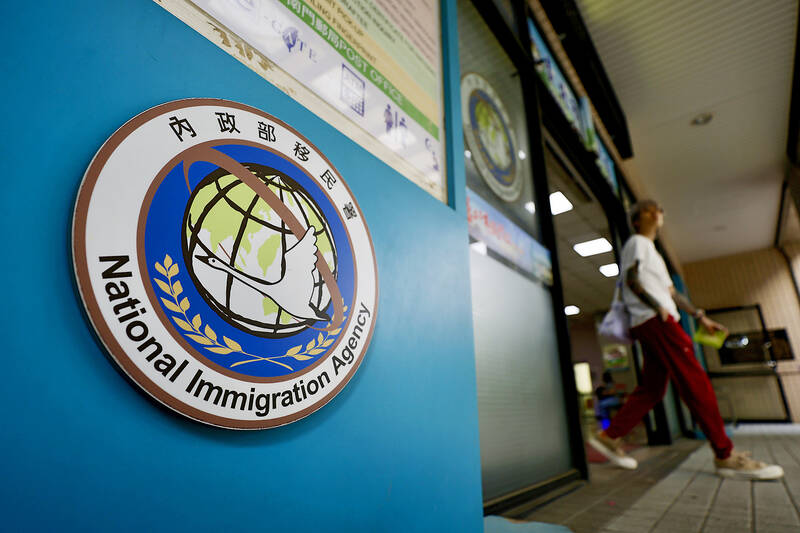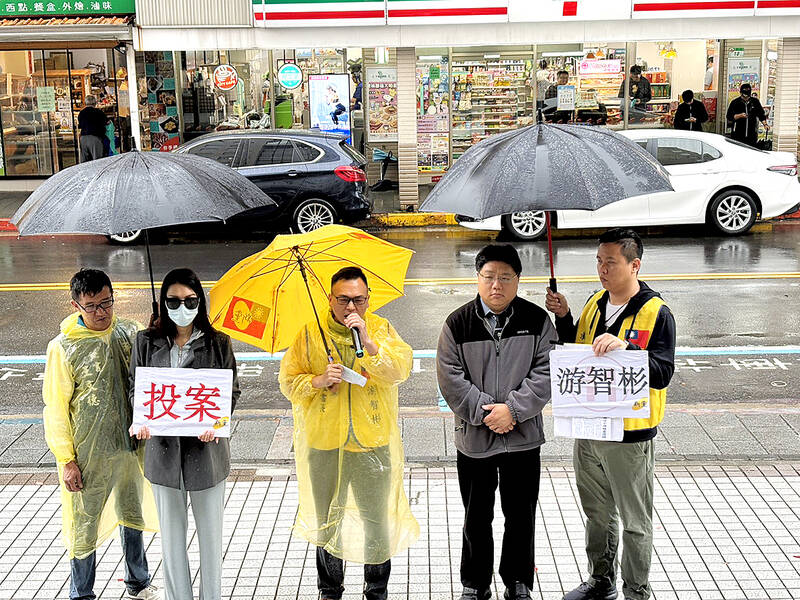Last week, the the National Immigration Agency (NIA) told the legislature that more than 10,000 naturalized Taiwanese citizens from the People’s Republic of China (PRC) risked having their citizenship revoked if they failed to provide proof that they had renounced their Chinese household registration within the next three months.
Renunciation is required under the Act Governing Relations Between the People of the Taiwan Area and the Mainland Area (臺灣地區與大陸地區人民關係條例), as amended in 2004, though it was only a legal requirement after 2000. Prior to that, it had been only an administrative requirement since the Nationality Act (國籍法) was established in 1929.
Deputy Director-General Chen Chen-cheng (陳建成) said that the Taiwanese citizens in violation of the law had been receiving notices to supply the necessary documentation for months.

Photo: Reuters
The notices had been issued long before the government kicked out the notorious three PRC influencers whose dependent-based residency permits it revoked last month for “reunification” comments made online.
Most of the 10,000 people failed to provide documentation because of health problems related to the COVID-19 pandemic and paperwork issues, Chen said.
It’s 2025. Pandemic eased a couple of years ago. It is easy to ask: would any other naturalized citizens be shown such forbearance, permitted to keep their old citizenship for years after naturalizing? But that question is wrong.

Photo: EPA-EFE
No, these 10,000 cases don’t show the government’s leniency or harshness (cue: “Green terror!”) towards PRC citizens. Rather, it shows, once again, the stupidity, rigidity and deep racism of Taiwan’s immigration laws. If Taiwan had a reasonable 5-7 year path to dual citizenship, these people would not be facing onerous and risky returns to the PRC to get paperwork, and the government would not be looking like it has picked a specific population to terrorize.
The Chinese Nationalist Party (KMT) and other PRC-aligned parties lost no time in pouncing. On Thursday last week, New Party Deputy Secretary-General You Chih-pin (游智彬) went to the NIA to “turn himself in,” after being notified that he had failed to provide proof of having renounced his Chinese household registration. He naturalized in 1995, before the requirements. You’s move was a potent political stunt.
KMT caucus whip Fu Kun-chi (傅崐萁) chastised the government, saying that chasing twenty-year-old bureaucratic violations is a violation of human rights. It must be admitted that the KMT knows a thing or two about violating human rights.

Photo: Wang Kuan-jen, Taipei Times
Yes, bad policy always creates bad optics.
THE DUAL DILEMMA
What the government should be doing is giving them all an amnesty and then changing the laws to permit all residents to become Taiwanese. The distortions in Taiwan’s immigration system occur because the government keeps evading the possibility of a dual citizenship path. Hence, it must constantly spawn new categories of immigration exceptions that gradually evolve into permanent problems, like the status of PRC spouses. Similar categories easily come to mind: the stateless children of runaway migrant workers, for instance. The government would rather have thousands of stateless children in Taiwan than offer them what might become dual citizenship.
The lack of a clear, universal dual nationality path is part of the “hypocrisy of sovereignty,” as scholar Isabelle Cheng terms it.
“This hypocrisy is manifested by Taiwan’s flexibility towards Japanese citizens’ unavailability of renunciation, in contrast to Taiwan’s rigidity towards Vietnamese citizens and its pragmatism of using household registration as a make-believe nationality for Chinese citizens,” she notes.
The cross-strait relations act defines PRC spouses as neither foreign nor domestic but “special.” Foreign spouses must relinquish their original nationality, but Chinese spouses are required only to cancel their household registration in China. The PRC, she observes, winks at this practice.
She contrasts this, and Taiwan’s acceptance of Japan’s refusal to permit its people to give up their citizenship, with Vietnam, the Philippines and Indonesia. The latter three accept the PRC’s claim to sovereignty over Taiwan, but treat Republic of China (ROC) sovereignty as real for the purposes of its citizens who wish to acquire ROC citizenship and give up their own.
In ROC practice, foreigners are treated as inferiors who are costly sites of (cultural) contamination and disease that may erode Taiwan’s competitiveness, says Cheng, particularly those from Southeast Asia. That is the reason the government in 2005 added Chinese language proficiency as a prerequisite for naturalization, she observes.
Time has not mellowed that racism. In November of 2024, the Ministry of the Interior (MOI) rejected a petition from thousands of long-term residents asking the government to establish a dual citizenship path.
“If foreign nationals who have lived permanently for five years [in Taiwan] can naturalize without having to prove the loss of their original nationality, it may have a significant negative impact on our country’s finances, social welfare and national security,” the MOI said.
The Taiwan government also imagines that “culture” is an identifiable, eternal, immutable thing whose purity requires that pesky foreigners be kept at arm’s length.
Clearly the government thinks of foreigners as irritants, not participants. If we are so costly, why does Taiwan keep asking for workers from abroad?
POPULATION PROBLEMS
One of the leaders of the rejected dual citizenship petition effort described Taiwan’s most recent demographic statistics on Bluesky the other day: “Taiwan’s population declined by 25,278 people in the first quarter of 2025. Births declined by 7 percent year-on-year. Crude birth rate is down to 5.08 percent. Demographic decline is starting to pick up speed, on track for population decline of 100,000 in 2025, compared to 20,000 in 2024.”
Taiwan’s massive shortage of labor is only going to get worse. The problem is not that people are avoiding work: the February 2025 unemployment rate was the lowest for that month in 25 years. There simply are not enough warm bodies. The government, which has its usual policy of temporary solutions to permanent crises, has mooted bringing in more “migrant workers,” another exceptional category that lies at the intersection of racism and the lack of a dual citizenship path. The mirror category of “migrant worker” is “Gold Card,” another exception created as a dual citizenship dodge.
Dual citizenship is no panacea for Taiwan’s plummeting birthrate and shrinking population, as immigrants do not have significantly more children. But citizenship is an important perk for people looking at countries to work and live in. In fact, one of the PRC citizens just captured in Ukraine said that he had joined the Russian army to obtain Russian citizenship.
If foreign citizenship is considered so valuable that people will risk death in war to obtain it, perhaps the government could get a leg up on competitor states by offering it to people who come to work peacefully in Taiwan.
Notes from Central Taiwan is a column written by long-term resident Michael Turton, who provides incisive commentary informed by three decades of living in and writing about his adoptive country. The views expressed here are his own.

Google unveiled an artificial intelligence tool Wednesday that its scientists said would help unravel the mysteries of the human genome — and could one day lead to new treatments for diseases. The deep learning model AlphaGenome was hailed by outside researchers as a “breakthrough” that would let scientists study and even simulate the roots of difficult-to-treat genetic diseases. While the first complete map of the human genome in 2003 “gave us the book of life, reading it remained a challenge,” Pushmeet Kohli, vice president of research at Google DeepMind, told journalists. “We have the text,” he said, which is a sequence of

On a harsh winter afternoon last month, 2,000 protesters marched and chanted slogans such as “CCP out” and “Korea for Koreans” in Seoul’s popular Gangnam District. Participants — mostly students — wore caps printed with the Chinese characters for “exterminate communism” (滅共) and held banners reading “Heaven will destroy the Chinese Communist Party” (天滅中共). During the march, Park Jun-young, the leader of the protest organizer “Free University,” a conservative youth movement, who was on a hunger strike, collapsed after delivering a speech in sub-zero temperatures and was later hospitalized. Several protesters shaved their heads at the end of the demonstration. A

Every now and then, even hardcore hikers like to sleep in, leave the heavy gear at home and just enjoy a relaxed half-day stroll in the mountains: no cold, no steep uphills, no pressure to walk a certain distance in a day. In the winter, the mild climate and lower elevations of the forests in Taiwan’s far south offer a number of easy escapes like this. A prime example is the river above Mudan Reservoir (牡丹水庫): with shallow water, gentle current, abundant wildlife and a complete lack of tourists, this walk is accessible to nearly everyone but still feels quite remote.

In August of 1949 American journalist Darrell Berrigan toured occupied Formosa and on Aug. 13 published “Should We Grab Formosa?” in the Saturday Evening Post. Berrigan, cataloguing the numerous horrors of corruption and looting the occupying Republic of China (ROC) was inflicting on the locals, advocated outright annexation of Taiwan by the US. He contended the islanders would welcome that. Berrigan also observed that the islanders were planning another revolt, and wrote of their “island nationalism.” The US position on Taiwan was well known there, and islanders, he said, had told him of US official statements that Taiwan had not